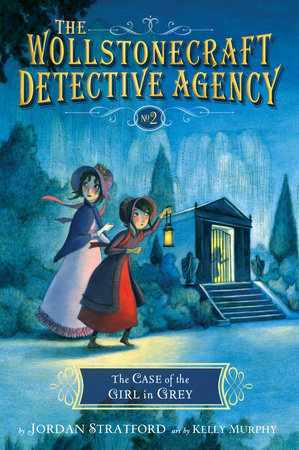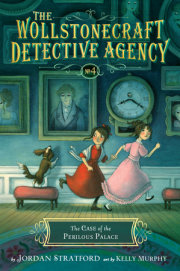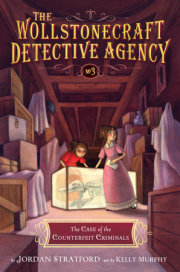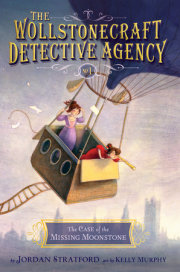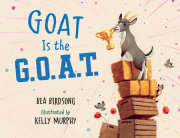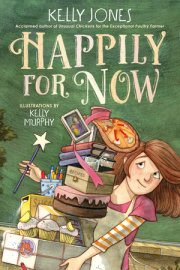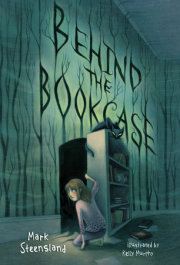Disarming
1
“Did!” Ada growled through gritted teeth. She whirred the black iron coal shovel down through the air at her sister.
Nimble as a circus performer, nine-year-old Allegra pivoted on the stair just in time to dodge the slice of the shovel. She pressed her own attack up the stairs, lunging with her hooked fire poker.
“Did not!” shouted Allegra.
“Did!” cried Ada, knocking the poker aside with her shovel.
The two girls tradedblows, one scratching the paneling of the stairway, the other taking a deepchunk out of the white banister.
Allegra hopped back down one stair, then up again, thrusting past Ada’s head, pulling back to use the poker’s nasty hook. Ada raised her shovel over her shoulder to catch the hook with another clang and a puff of soot.
Poker and shovel locked together, the older sister flicked her wrist, whipping the poker from Allegra’s grip, spinning it right around until it shot like an arrow back down the stairs to embed into the doorframe with a reverberating thud.
Ada leveled the shovel into Allegra’s face in triumph. Quick as lightning, Allegra dropped to her knees, grabbed her sister’s ankles, and gave a sharp yank. Ada’s bottom spanked hard against the wooden stair. She started to yowl like a wet cat, the shovel skittering down the stairs and along the tiled hall.
The toe of a gleaming black shoe stopped the shovel’s slide. Above the black shoe was a black-cuffed trouser of a long black suit, and very far atop the suit was the drawn and displeased face of Ada’s very large, tall butler, Mr. Franklin. He said nothing, but his silence and his look of disapproval were enough to stop Ada’s wailing immediately. He folded himself to pick up the shovel without bending his legs, which struck Allegra as very flexible and Ada as a long way down, and rose again to pluck the still-trembling poker from the woodwork.
Embarrassed, both girls rose and coughed, smoothing their gowns and brushing the soot from their hands, making more of a mess in the process. Neither sister could entirely remember the reason for the staircase duel in the first place, “dids” and “did nots” gone in an instant.
The butler stared at the pair for a moment with a raised eyebrow, then slowly turned, returning the implements to the fireplace. The girls remained humbled for as long as theycould manage, which was about two entire seconds.
“That was brilliant!” cried Allegra. “You have to show me how to do that!”
“The disarm? It’s in the book. Agrippa, I think. Capo Ferro? Fencing books. They’re in the library.”
“You couldn’t just show me?”
“You couldn’t just read a book?” Ada replied.
“Honestly, Ada, you’re mean.”
“You’re impossible,” declared Ada, marching up the stairs to the library. Allegra followed, although she pretended not to.
Ada found a book on sixteenth-century fencing and pressed it into her sister’s hands. “Didn’t you take a room?” she asked, still pushing on the book, prodding Allegra subtly toward the door.
“I took three, really,” admitted Allegra, not taking the hint at all. “They were just empty.”
“They weren’t empty--they had things in them.”
“Things under sheets,” Allegra clarified.
“Things that weren’t yours,” Ada replied.
“Well, they’re just rooms. And you have a lot of them.”
Indeed, there were a lot of rooms in the stately Marylebone house in the heart of London, and most of them were empty, except for things under sheets. Curiously for such a grandhouse, there had been only four people living there: Lady Ada Byron; her silent butler, Mr. Franklin; the cook, whose name Ada really was making an effort to remember; and Miss Cumberland, Ada’s maid. Ada’s father, the notorious Lord Byron, had died on an adventure in Greece two years earlier, when Ada was nine, and her mother had taken to the family estate in the country. But she had not taken Ada. This had left Ada alone with the three servants. Alone, that is, until Ada’s half sister, Allegra, had arrived on Ada’s doorstep, taking over three rooms and never seeming to settle in any of them.
Until very recently, Ada’s world had been a comfortable, sense-making place of books and ideas, of drawings and charts, of mathematics and puzzles, of machines and inventions and a hot-air balloon of her own making, tethered to the roof, in which to think. Then a month ago all had changed. Her governess had departed, a tutor had arrived, and a fellow tutee and friend with an appetite for adventure appeared. That was certainly enough change for one eleven-almost-twelve-year-old girl.
And none of that called for an additional sister.
Ada admitted to herself that Allegra was a most capable nine-year-old. She could read and write andjuggle, she could do perfect handstands and even recite some Latin and Italian due to having been raised by nuns on the continent. But “settling” seemed completely beyond Allegra’s abilities. She would fidget, or tap, or twirl at random, or run all the way upstairs and all the way down again if she forgot something. Allegra was so unsettled that she unsettled herself all the way from Italy to England, seemingly for the sole purpose of unsettling Ada.
“You’re only here until--”
“I know, I know,” Allegra interrupted. “Christmas, when your mother gets home. I’ll bet she’ll have kittens when she sees me!”
“You think she’ll bring you a cat?” asked Ada, confused.
“No, cranky-head. It means she’ll go mad! I’ll remind her of our dad, and she absolutely hates him. And me. Isn’t that marvelous? She’ll lay an egg!”
Ada loved words and tried to use them very carefully. She found her sister’s jumble of egg-laying kittens unsettling. Here, in the library in front of all these treasured books, mixing up words seemed even worse than usual.
Ada really wanted to be alone, but it seemed that three almost-empty bedrooms was not enough space for Allegra to twirl about in.
“Never mind me--” started Allegra.
“I won’t, then,” interrupted her sister, more nastily than she intended.
“I’ll be off to the circus soon,” continued Allegra. “I ran away from the nuns for some excitement. And your detective agency is boring.”
“That’s not what you wrote in your letter,” said Ada. “You wrote that you were coming here to be a Wollstonecraft detective, even though it’s supposed to be a secret.”
“It is a secret!” said Allegra excitedly. “That’s why I wanted to do it in the first place.”
“If it’s a secret, how did you know? And how did Mother know?”
While Ada had her suspicions, she wasn’t sure.
She and Mary Godwin had been entirely clandestine when they’d placed an advertisement in the Times to announce the formation of a private and secret constabulary for the apprehension of clever criminals. And they had used clandestine names when they pursued their first case. Yet a week ago, Ada had received a letter from her mother, the baroness, ordering her to shut down the Wollstonecraft Detective Agency, and the very next day, Ada had received a letter from her half sister, Allegra, saying that she was coming to join them. How did everyone know?
“Nuns!” answered Allegra. “Nuns know everything. They have some sort of secret nun powers.”
“Nuns?” Ada was unconvinced. “You may have lived in a convent, but Mother--”
“Secret nun powers,” Allegra repeated. “Anyway, I heard them talking about how your mother was going around the bend--”
“What bend?”
“The bend. About you and Mary playing detective.”
“We weren’t playing. We are detectives. We detected. We put a clever criminal in the newspaper.”
This was true. Ada and Mary had solved a rather delicate case involving a missing jewel, a distraught heiress, an innocent maid, a phony fishmonger, and three men in red fezzes. The clever criminal was indeed in the newspaper, and he was also in prison.
Sadly, Ada’s hot-air balloon had been lost in the apprehension of the culprit. Its charred remains (the balloon, not the culprit) were now on the bottom of the river Thames rather than at the top of the Byron house. Ada had been sketching plans for an improved balloon--but it wouldn’t be ready soon enough to save her from her unsettling sister.
“In any event, you’re boring, and you won’t let me be a detective, so I’m off to the circus. Straightaway after Christmas.”
“We’re not boring, Allegra. Mary and I are trying to help people. I’m the clever one, and Mary does people. Well, she notices things about them. It’s not that we won’t let you. I just don’t know what you’d do.”
“I can juggle.”
“How would that help?” Ada asked.
“I’m very bendy. I’ve been practicing for the circus.”
“We’re a secret constabulary, Allegra. We don’t need bendy.”
“You never know,” sulked Allegra.
Copyright © 2016 by Jordan Stratford. All rights reserved. No part of this excerpt may be reproduced or reprinted without permission in writing from the publisher.

